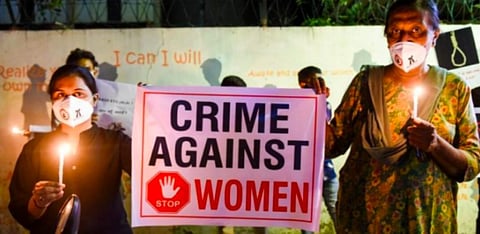

New Delhi: According to the latest National Crime Records Bureau (NCRB) report, crimes against women in India have dipped in 2020 by over 8% in comparison to 2019.
"A total of 3,71,503 cases of crime against women were registered during 2020, showing a decline of 8.3% over 2019 (4,05,326 cases)," the report said.
The NCRB report said that the dip in the number of cases of crimes against women was due to the COVID-19 lockdown. "The country remained under complete lockdown from 25th March, 2020 and 31st May, 2020 due to COVID-19 Pandemic (First Wave), during which time movement in public space was very limited. The cases registered under Crimes against Women, Children and Senior Citizens, Theft, Burglary, Robbery and Dacoity have therefore declined," the report said.
However, experts that NewsClick spoke to felt the dip in crimes against women in the report reflected underreporting of cases as the lockdown only worsened women's access to police and courts. While acknowledging that the report has taken note of the high number of cases of domestic abuse during the period, they called for alternative means of data collection now that lockdown restrictions had been lifted so that there is a truer picture of crimes against women in the last year.
While the NCRB report has noted a dip in the total number of cases of crime against women, it has noted a spurt in domestic violence cases. According to the report, the majority of cases under the Indian Penal Code were registered under 'Cruelty by Husband or His Relatives' at 30.0%. The rest included 'Assault on Women with Intent to Outrage her Modesty' (23%), 'Kidnapping & Abduction of Women' (16.8%) and 'Rape' (7.5%).
The increasing number of cases of domestic violence in 2020, particularly during the lockdown, was also highlighted by the National Commission for Women (NCW) earlier this year. NCW is a statutory body under the Union Ministry for Women and Child Development.
As per NCW, it had received a total of 23,722 complaints in 2020, the highest in the past six years. Of these, the highest numbers of complaints received were 7,715 under 'right to live with dignity', 5,297 under 'protection of women from domestic violence' and 3,788 under 'harassment of married women/dowry harassment'.
A parliamentarypanelreport in March 2021 also highlighted the spurt in domestic violence cases on the basis of the NCW data. "The Committee notes that there was a sudden spurt in domestic violence and trafficking of women and children during the unprecedented COVID-19 Pandemic outbreak. This was mainly due to disruption in economic activities, work from home and family spending more time at home during lockdowns," it noted.
However, when NewsClick asked NCW chairperson Rekha Sharma why this increase in cases and complaints were not reflected in the NCRB data, she refused to comment on the report. "I cannot comment on the NCRB report as it reflects the data that the police compile, but I can say on the basis of our (NCW) data that we received more complaints in 2020 than in other years. This is especially true during the first wave lockdown when domestic violence cases shot up," she said. "However when I conducted a meeting with all state DGPs (police chiefs) last year, they said that the number of complaints they have received have gone down," she added.
Some experts that NewsClick spoke to said one reason why the NCRB data points to a dip in crimes against women is under-reporting. "Crime against women is still very high in the country. The data represented in the report is under-reported as the lockdown has further worsened women's access to register cases of crime against them," said Poonam Muttreja, Executive Director, Population Foundation of India.
"If we look at different heads of crimes against women – we find an increase in 2020 over 2019 in Prohibition of Child Marriage Act, abetment to suicide of women and cyber crimes. Also, there are state -level variations –Odisha, Tamil Nadu, Uttarakhand, West Bengal, Meghalaya, Sikkim, Mizoram, Jammu & Kashmir, Puducherry and Andaman & Nicobar Island reported increased crime against women in 2020 over 2019," she added.
Some experts also felt that since NCRB relies solely on police records it cannot be wholly reliable. "NCRB data is prepared on the basis of police records. Naturally, no one stepped out during the lockdown to register cases, but violence at home increased during this time. NCW's data shows increased domestic violence cases during this period. Overall lack of data is due to non-access of services to women, resulting in a dip in cases," said Ranjana Kumari, Director, Centre for Social Research.
Experts said there is need to not just rely on NCRB data but rather use alternative mechanisms.
"There is a need to make a better assessment of the situation and get to the reality of the data on crimes against women. Reports or complaints can be registered either by block level officers and district officers to the police headquarters." said Kumari.
"There should be emphasis on greater reporting on violence in COVID-19 response plans. To address crimes against women, it is important to acknowledge the extent of gender-based violence, reimagine government policies, and support networks to make it easier for the victims to access them," said Muttreja.
In addition, experts felt that while NCRB data is useful, it still needs to be unpacked. "While this is useful data we need more data on what happens next, how many cases go to court and lead to conviction, for instance. Are CCTV cameras proving to be useful in providing evidence? Such data will build confidence among women and encourage them to report more," said Kalpana Vishwanath, co-founder and CEO, Safetipin, a social organisation working towards women's safety.
First published by Newsclick.